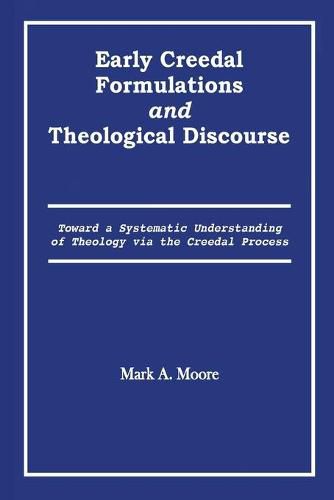Readings Newsletter
Become a Readings Member to make your shopping experience even easier.
Sign in or sign up for free!
You’re not far away from qualifying for FREE standard shipping within Australia
You’ve qualified for FREE standard shipping within Australia
The cart is loading…






This title is printed to order. This book may have been self-published. If so, we cannot guarantee the quality of the content. In the main most books will have gone through the editing process however some may not. We therefore suggest that you be aware of this before ordering this book. If in doubt check either the author or publisher’s details as we are unable to accept any returns unless they are faulty. Please contact us if you have any questions.
Theology is a grand conversation, comprised of a myriad of voices and viewpoints. A great temptation exists within theology today, however, which could signal the loss of a unique Christian identity. The creedal formulations of the early church were never meant to serve as shackles constricting further theological exploration. They were, and still are, relevant guides in assessing the crowded conversation of theology. Early creedal formulations identified and articulated primary affirmations of the biblical narrative not to put an end to the conversation but rather to focus the conversation on the unique Christian identity of God as presented in Scripture. This book examines the function of early creedal formulations as essential identity markers in theological discourse with the goal of constructing an approach to the various subcategories of systematic theology that mirrors the creedal process. This approach, termed here as Essential Identity Markers (or simply EIM), seeks to identify and articulate the essential identity markers of a given theological subcategory, in order to define the proper parameters for theological discourse while still allowing such discourse to develop and expand within the articulated identity markers. The EIM model constructed and proposed in this book offers an approach to theology that mirrors the creedal process and seeks to guide modern theological conversations as the community of faith continues to explore the space framed by these markers.
$9.00 standard shipping within Australia
FREE standard shipping within Australia for orders over $100.00
Express & International shipping calculated at checkout
This title is printed to order. This book may have been self-published. If so, we cannot guarantee the quality of the content. In the main most books will have gone through the editing process however some may not. We therefore suggest that you be aware of this before ordering this book. If in doubt check either the author or publisher’s details as we are unable to accept any returns unless they are faulty. Please contact us if you have any questions.
Theology is a grand conversation, comprised of a myriad of voices and viewpoints. A great temptation exists within theology today, however, which could signal the loss of a unique Christian identity. The creedal formulations of the early church were never meant to serve as shackles constricting further theological exploration. They were, and still are, relevant guides in assessing the crowded conversation of theology. Early creedal formulations identified and articulated primary affirmations of the biblical narrative not to put an end to the conversation but rather to focus the conversation on the unique Christian identity of God as presented in Scripture. This book examines the function of early creedal formulations as essential identity markers in theological discourse with the goal of constructing an approach to the various subcategories of systematic theology that mirrors the creedal process. This approach, termed here as Essential Identity Markers (or simply EIM), seeks to identify and articulate the essential identity markers of a given theological subcategory, in order to define the proper parameters for theological discourse while still allowing such discourse to develop and expand within the articulated identity markers. The EIM model constructed and proposed in this book offers an approach to theology that mirrors the creedal process and seeks to guide modern theological conversations as the community of faith continues to explore the space framed by these markers.